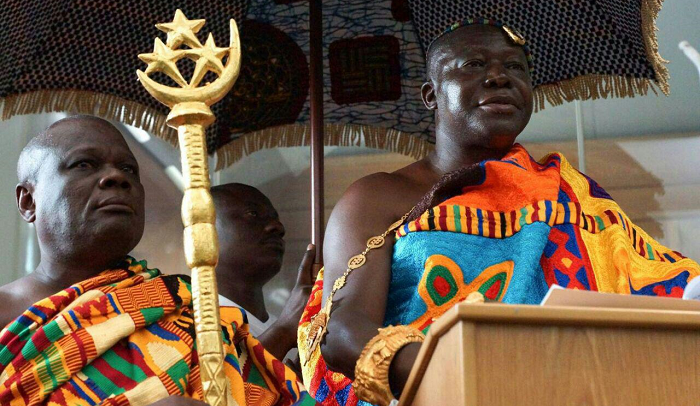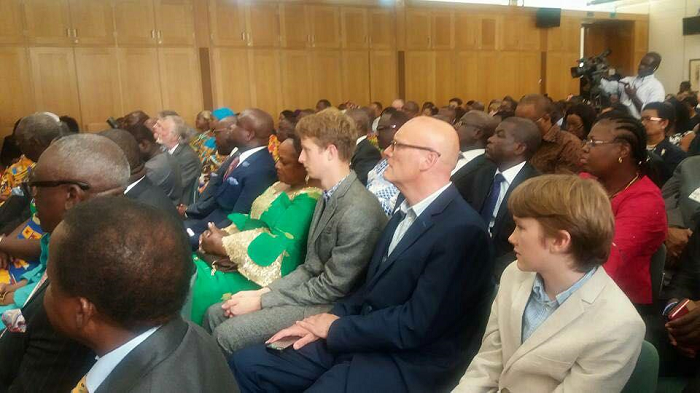
Africa must practise what it preaches — Asantehene
The fundamental challenge confronting Africa is the fact that its people had spent too much time on the diagnosis of the continent’s problems and the prognosis of their conditions, the Asantehene, Otumfuo Osei Tutu II, has noted.
According to him, the current difficulties confronting the continent were not merely to identify the best practices and approaches needed to establish democratic growth and development but rather it was “time for us to devote some time to practise what we preach”.
Diagnosing the problems that have impeded the rapid development of Africa over the years when he delivered a lecture at the British House of Commons in London last Wednesday, Otumfuo Osei Tutu II said the continent had the potential to become a world power provided the right conditions and proper leadership were in place.
He spoke at the launch of two books titled “All the Good Things Around Us: An Anthology of African Short Stories” and “May Their Shadows Never Shrink: Wole Soyinka and the Oxford Professorship of Poetry”.
They were jointly authored by Mr Ivor Agyeman-Duah, a former aid to former President John Agyekum Kufuor and Nana Ayebia, a Ghanaian-born publisher resident in Britain.
The book launch was in honour of a Nigerian playwright, poet, author, teacher and political activist who received the Nobel Prize for Literature in 1986, Prof. Wole Soyinka.
Woes of Africa
Speaking on the theme: “Africa’s Democratic Dividend and the search for Economic Transformation”, the Asantehene said nearly 40 of the 50 countries within the erstwhile Organisation of African Unity (OAU) had military and dictatorial regimes that suppressed the rights of the people.
That situation, he said, deprived Africa the much needed human resource because scores of Africans in those countries fled the continent to relocate abroad for fear of their lives.
He buttressed his arguments when he singled out South Sudan as a country that had been plunged into civil war since its independence after breaking away from The Sudan.
The traditional leader contended that more than 100,000 people in South Sudan had been displaced, coupled with the killing of innocent people, adding that “it will take that country 20 years to function as a proper nation state.”
Otumfuo Osei Tutu II also spoke about the Genocide in Rwanda which left many people dead.

Electoral disputes
Touching on electoral disputes that had led to violence in parts of the continent, he said political parties in some cases resorted to the courts but expressed concern that voters did not vote on issues.
He also expressed regret that what motivated most people to vote was primarily informed by the benefits derived from political patronage and the search for political god fathers against the interest of the larger population.
Weak authorities
The Asantehene said colonial rule destroyed the traditional foundation on which Africa existed, as great effort was made through education to undermine confidence in traditional institutions.
He said that situation had created difficulties in the post independence era when traditional authorities were often seen as instruments of the colonial administration.
Otumfuo Osei Tutu added that the political architecture that was thus constructed during post-colonial Africa had very little regard for Africa’s traditional institutions.
He explained that the disconnect between the people and their traditional leadership created a void that was replaced by demigods and agitators who exploited the people for their own ends.
Wole Soyinka
Expressing his appreciation for the honour done him with the launch of the books, Prof. Soyinka, in his usual humour, said “we inherited tribalism from Britain” which provoked laughter among the guests.
He extolled the virtues of literature and commended young generational African writers for their effort.
The authors took turns to address the gathering.
The Member of Parliament for Hackney, Madam Diana Abott, later conducted the Asantehene, his spouse Lady Julia and other guests round the House of Parliament in Westminster.
Among the dignitaries were Lord Paul Boateng, a Ghanaian born British politician.
